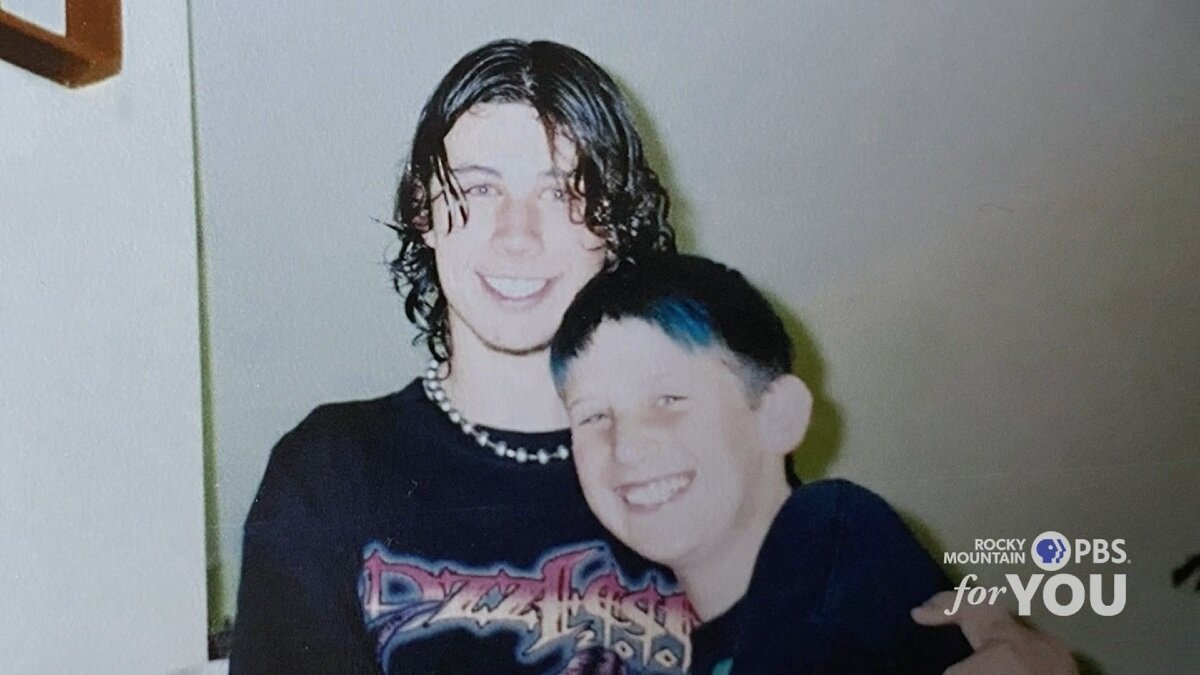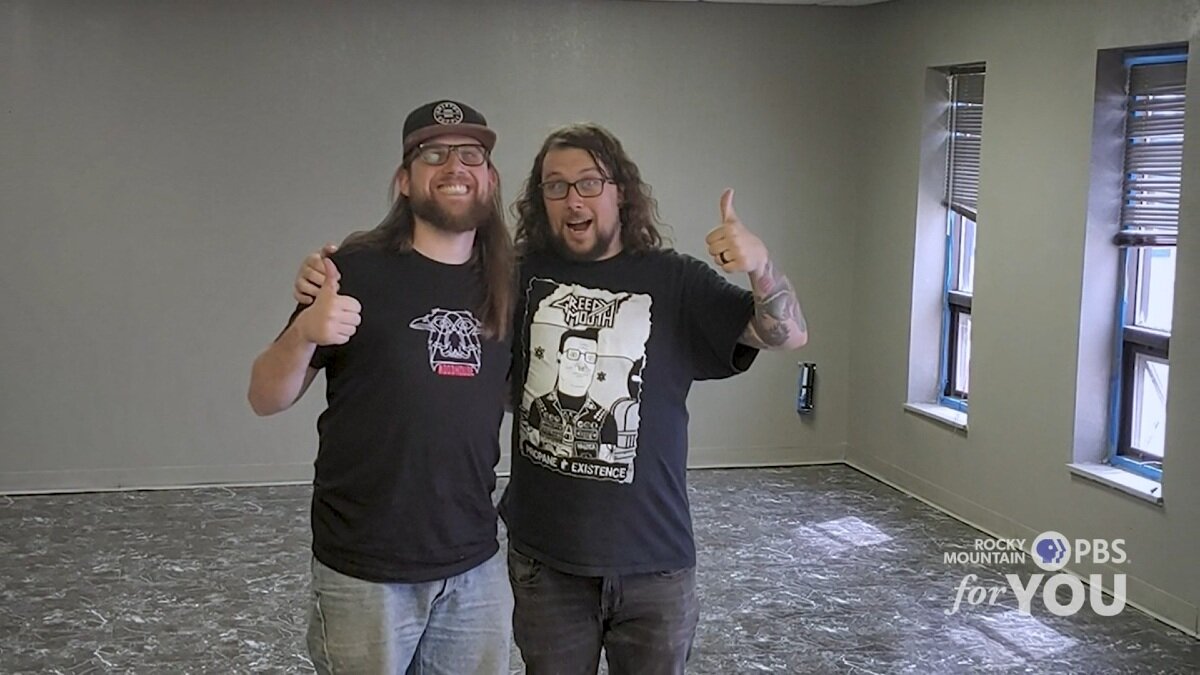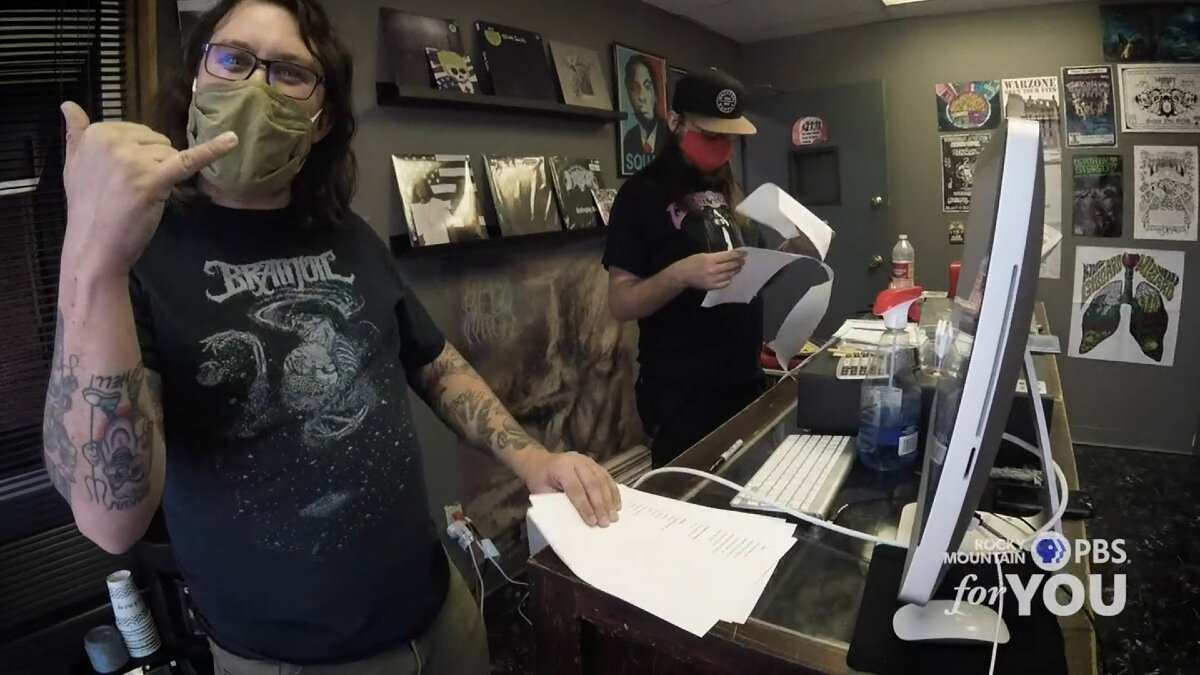What’s Left Records fosters community during local music crisis

Visitors to Colorado Springs’ newest record shop are greeted outside with an apropos welcome: a fresh, brightly-colored, music-themed mural by artists PAES164 and EMVY of the neighborhood Knob Hill Urban Arts District collective. A boom box, musical notes, metal guitar, and headphones are harbingers for the bounty inside.
What’s Left Records opened its doors on August 1 on the second floor of 829 N Circle Drive. The 400-square-foot-store features new and used vinyl records, cassette tapes, CDs, band tees, books, magazines, glass, and art, with a focus on Colorado, DIY, and underground artists.
This music-lover’s haven is owned and operated by brothers Bryan and Sean Ostrow, mainstays — if not legends — in the local scene.
“We’ve been in bands, running venues, and doing music stuff together for a long time,” Bryan says.
Until March of this year, the brothers both worked as bartenders, live music talent buyers, and promoters, booking stages in venues across Colorado Springs.
“When all the COVID stuff started happening, we were both out of a job,” Bryan says.
So they turned their attention — and newfound spare time — to a project they’ve thought about for a long time.
“It’s always been our dream to start a record store,” says Sean. “We’ve literally talked about it since we were kids.”
“We decided to turn our unemployment money into employment,” says Bryan. “All the money we got from that, we invested into opening up this store.”
Bryan says in a time of economic uncertainty, he and his brother wanted to create their own jobs. “And this is a cool way to do it. We can still share music, and we’re still able to bring the community together, but in a safer way,” he says.
In the face of COVID-19 venue closures, cancelled performances, and limited social gatherings, Bryan says connection to the arts is vital.
Vinyl records continue to make a comeback. For the first time since the 80s, vinyl records outsold CDs, according to a mid-year report from the Recording Industry Association of America. The shift is a positive signal for the Ostrow’s new brick-and-mortar business. Still, declining sales during the international pandemic have temporarily closed — or in some cases, permanently shuttered — some local music outlets.

Meanwhile, the Ostrows are committed to providing a retail rock ‘n’ roll sanctuary for mainstay and new artists alike. Their selection is focused on helping patrons discover and support local bands, many of whom have their merchandise for sale on consignment.
“That’s why it’s awesome to be able to have a record store now — to still be able to push music out, and help local bands,” says Sean. “That’s the cool thing. It can still bring people together.”
The Ostrows have not only felt the pulse of the Colorado Springs music scene — they’ve often created it. Since high school, their passion for bonding over shared musical experiences led the brothers to bring their favorite local, national, and international artists to the city’s stages, basements, and house shows. These pay-what-you-can events have been the epicenter of the Colorado Springs’ music scene for 15 years.
And their new record store, the Ostrows say, is an extension of this community-based mentality.
“DIY means Do It Yourself. Put out your own records. Screen print your own t-shirts. Book your own shows. That’s DIY in a nutshell,” says Bryan. “But what we really like is DIT: Do it Together. We have a whole sense of community. If it wasn’t for all of us working together and contributing, none of this could happen."
Bryan and Sean graduated from Doherty High School in Colorado Springs in 2005 and 2009, respectively.
Both played in bands in venues around town, and both of their lives centered around weekly trips to local CD stores to search for new music.
Growing up, the brothers frequented CD Warehouse, often skipping school to hang out and explore the shop’s inventory.
“Sean used to have spiky, bleached hair. He was really into Good Charlotte and New Found Glory,” Bryan recalls. He says his little brother begged him to be able to play music.
“I was a good brother, so I let him play,” Bryan says.
Sean looks skeptical. “No, you did not let me play,” he counters. The brothers laugh.
“Bryan was the ‘nu metal’ kid. He wore ball necklaces. We had great parents, but life was hard, you know,” Sean remembers, teasing his older brother.

Sean says the music scene wasn’t perfect when they were growing up in Colorado Springs. He and his brother began creating and booking their own local music shows.
“We’ve always heard people say, ‘Colorado Springs sucks, there’s no good shows, they’re always in Denver,’ or ‘I’m going to move to Portland or somewhere where it’s already happening,’” Bryan says. “And instead of doing that, we said, ‘Let’s just make something here.’”
Bryan learned the ins and outs of the music business by creating a recurring festival called Falcon Fest right out of high school. “It was a 10-band house party festival,” he says.
And he never stopped.
“I don’t even know how many shows I’ve booked. 15,000?” Bryan jokes. “We’ve booked a lot of shows.”
The Ostrows helped run a collective DIY venue in Colorado Springs, the Flux Capacitor, from 2014 to 2016, booking over 500 shows in those two years. The Flux was heralded as a crux of local music discovery, and became a well-known, all-ages stopping point on the network of DIY tour communities across North America.
The Flux operated as many DIY venues do: in an inexpensive rented warehouse with little overhead, on a volunteer basis, and with a suggested donation instead of a fixed ticket price.
A devastating and fatal fire at the Ghost Ship DIY space in Oakland, CA at the end of 2016 prompted a nation-wide closure of local underground venues, including the Flux, says Bryan.
“It wasn’t police or the fire department coming in on their own and shutting us down,” Bryan says. He says the Flux was closed due to a lack of adequate fire exits after the local fire department was tipped off by someone from an online conservative forum. “It was political,” he says. “They considered DIY venues to be hot beds for so-called ‘liberal radicalism.’”
Though the Flux closed its doors, no shows were cancelled. Instead, the Ostrows worked with other local venues to re-book bands.
“We were just doing it for the love of it,” says Sean. “We’ve had so many awesome bands come to Colorado Springs that we never thought we’d get to come to town. And we’ve gotten a lot of good friends out of it.”
Though the city has a limited number of official live music venues, “We haven’t stopped,” Bryan says. “We’ve booked wherever we can, all over town.”
“And since we’re not able to book shows right now, we’re able to make this record store instead,” says Sean. “We like to keep the positivity flowing.”
The name for the record shop started with a zine (slang for a self-published magazine). What’s Left Zine centered around local music culture before morphing into a record label, says Bryan. What’s Left Records releases limited runs of vinyl, cassettes, and CDs, many from Bryan’s favorite bands that he discovers while he and his brother are on tour.
“I would carry a portable record shop with me on tour,” Bryan says. “Then, when we had the Flux, we created a small record shop that also distributed our records. They were all good stepping stones to [right] here.”
Though they miss the atmosphere and energy of live music, Bryan and Sean are somewhat grateful for a respite after years of booking and playing shows.
“It’s a good forced break, to be honest,” says Bryan, who before the pandemic booked almost one show a night. “It’s really nice to not be doing shows for awhile. When it happens, it’s going to be awesome, but I’m in no rush.”

Sean says a physical record store provides tangible connection in an age when most sales and plays are tallied digitally.
“Today is a lot different than my youth. Now you can just stream everything,” Sean says. “But I really enjoy hard copies, and I really enjoy the search — going out and finding something new. That’s how we grew up doing it. So it’s nice to be able to keep that going.”
As local venues, bands, and music shops come and go through the years, Bryan says a dedication to “do it yourself” culture has helped augment longevity in the scene. A lack of public arts funding in Colorado Springs, he says, hasn’t deterred his mission to cultivate community surrounding local arts.
“Not every city is going to have all the access for arts and funding,” he says. “But that’s the thing about DIY. Just because you don’t have funding, doesn’t mean you can’t do it. You just have to find other ways.”
His advice to burgeoning scene-makers?
“Just don’t be afraid,” Bryan says. “Because if us weirdos can do it, anybody really can.”
What’s Left Records (719-203-5826) is located at 829 N Circle Drive in Colorado Springs. Store hours are Tuesday through Sunday, 11 am - 7 pm.